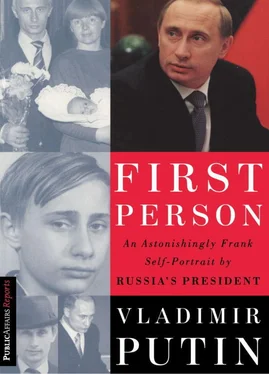Vladimir Putin - First Person
Здесь есть возможность читать онлайн «Vladimir Putin - First Person» весь текст электронной книги совершенно бесплатно (целиком полную версию без сокращений). В некоторых случаях можно слушать аудио, скачать через торрент в формате fb2 и присутствует краткое содержание. Город: New York, Год выпуска: 2000, ISBN: 2000, Издательство: PublicAffairs, Жанр: Биографии и Мемуары, Политика, Политика, Публицистика, на английском языке. Описание произведения, (предисловие) а так же отзывы посетителей доступны на портале библиотеки ЛибКат.
- Название:First Person
- Автор:
- Издательство:PublicAffairs
- Жанр:
- Год:2000
- Город:New York
- ISBN:978-0-786-72327-0
- Рейтинг книги:3 / 5. Голосов: 1
-
Избранное:Добавить в избранное
- Отзывы:
-
Ваша оценка:
- 60
- 1
- 2
- 3
- 4
- 5
First Person: краткое содержание, описание и аннотация
Предлагаем к чтению аннотацию, описание, краткое содержание или предисловие (зависит от того, что написал сам автор книги «First Person»). Если вы не нашли необходимую информацию о книге — напишите в комментариях, мы постараемся отыскать её.
First Person — читать онлайн бесплатно полную книгу (весь текст) целиком
Ниже представлен текст книги, разбитый по страницам. Система сохранения места последней прочитанной страницы, позволяет с удобством читать онлайн бесплатно книгу «First Person», без необходимости каждый раз заново искать на чём Вы остановились. Поставьте закладку, и сможете в любой момент перейти на страницу, на которой закончили чтение.
Интервал:
Закладка:
We’re always hearing that Russia has grown weak, and that a whole slew of problems are ensuing from that weakness, both at home and abroad. Your thesis is that Russia’s statehood must be restored—a strong state is needed. That’s understandable. Does that mean that state property also has to be restored?
No, of course not. But we have to have state property on a limited scale, where it is necessary. For example, in the defense industry.
Does that mean that the private sector should be expanded?
First, we need to guarantee property rights. I believe that one of the main purposes of the state is to create rules—universal rules—in the form of laws, instructions, and regulations. And secondly, to comply with these rules, and guarantee their compliance.
But we’ve already had lots of these instructions and rules, regulations, and laws, and where have they gotten us?
You’re right. And that is why the people do not trust the government. Look at all the types of laws that have been passed in the social sphere—for example, free transportation for members of the military. They may have passed the law, but in reality, the military pays for transportation. There are lots of other examples. In order to change this situation, the government will have to take some unpopular measures.
What unpopular measures?
We will have to review all the social guarantees that the state has taken upon itself in recent years and that are completely unfounded and not backed up. We have no choice.
Can you be more specific? Maybe you could use the example of free rides for military personnel?
Sure. Wouldn’t it be better to raise the salaries of some citizens, including military people? If you gave them just a little bit more money, they could pay their own fares and wouldn’t be put in such a humiliating position. But if the government does say that it will compensate those citizens—for example, for their fares—then it must do so.
I’m sure the leftist opposition will jump on me, saying that people are losing their benefits and that this is a blow against the helpless working people, who already have it so hard. But a government that doesn’t fulfill its obligations is not a government. And that’s why there’s such a lack of trust in the government now.
So you are entering into a deal with the leftists because you’ll need them when you have to make some unpopular decisions? Is that why you needed Seleznev as speaker of the House?
I need them? On the contrary, I told both Seleznev and Zyuganov to find a fresh face, even if it’s a person from their own camp.
But a Communist! You really wound up with a fresh face, didn’t you!…
Listen, there has always been cooperation with the Communists in our Duma. Not a single law passes without support from the Communists. It seems to me that there is more than one way to deal with the Communists. They have every opportunity to become a modern parliamentary party in the European sense of the word. We have very many parties, groups, grouplets, and associations without any real social base. And then there are the Communists—the only large-scale, really big party with a strong social base, albeit one infested with ideological “roaches.”
Name the “roaches” for us.
For example, the demands to confiscate and nationalize property.
That’s not going to happen?
That’s definitely not going to happen. We will not have another major tragedy. And we will not have a partnership with the Communists while they maintain that position. If some sort of unlawful actions in previous years were established and proven in court, that would be another matter. But nationalization and confiscation of property for their own sakes, without a judicial procedure is a catastrophe. If for no other reason than because they would clear the way for arbitrary rule.
Communists can either change their programmatic goals and become a major left-wing party of the European type, or they can take the other path and lose their social base through natural attrition. If they choose the latter, they will gradually exit the political stage.
They themselves hardly believe that.
As surprising as it may sound, their leaders do understand. And they are prepared to change their ways. But right now they can’t do it—they’re afraid that their constituency will feel betrayed. And on that score, it’s pretty important not to miss the moment—when and to what extent they can change internally.
For many people, “strong authority” is associated with dictatorship.
I prefer another phrase—not “strong,” but “effective” authority.
You can call it what you like. But how will that authority become effective? How will it enforce the rules it establishes?
The courts must work—as must the law enforcement agencies and the courts of arbitration. The role of these agencies has changed, and we refuse to understand that. Their role has begun to correspond to what is written in the law. Why don’t we pay judges and law enforcement agents the money that they deserve? Because Soviet ideology governs our consciousness to this day. Remember how we used to think: “Well, a court, what’s that? Nothing special. The district Party committee is the body that makes all the decisions. It’s important. But what do the judges do? They will do what they are told.”
To this day, people think that judges are not important, and that they shouldn’t be paid more than the average civil servant.
Or take the notary publics. In the French system, if a notary public stamps a document, it is ironclad law. If a notary public makes a mistake, he is obliged to pay compensation. Two mistakes, and he is ruined.
Our society must understand that a minority—a certain category of people—must be paid very well by the state, so that they can secure the interests of the majority. When will we finally begin to understand this? Our people aren’t stupid. It’s just that it hasn’t been explained the right way.
But the role of the courts has been explained. They’ve been explaining it for ten years! But until the courts change for the better, the attitudes toward them won’t change either. How else can you explain it?
More persistently. Without that, nothing will change. And we have to raise judges’ salaries.
Now, the governors are hardly going to line up behind your ideas about “effective” authority and the governability of the state. They’re all going to be afraid that you will cut off their independence.
I think that we have to preserve both local self-government and a system of election for governors. But all of these connections have to be more balanced. While preserving the system of electing governors, for instance, we should consider applying sanctions against them. To remove them from office, for example.
That is, elect some and remove others.
We can develop systems to link them more closely to the center. They cannot have complete independence.
Do you mean a system of oversight?
Oversight and influence. All members of the Russian Federation should be placed under equal economic conditions vís à vis the federal center. We have signed a huge number of agreements on the separation of powers, but some federation members have unjustified privileges that others don’t.
Tatarstan, for example?
Tatarstan, for example.
Shaimiev [32] Shaimiev is the president of Tatarstan.
may not understand you.
Интервал:
Закладка:
Похожие книги на «First Person»
Представляем Вашему вниманию похожие книги на «First Person» списком для выбора. Мы отобрали схожую по названию и смыслу литературу в надежде предоставить читателям больше вариантов отыскать новые, интересные, ещё непрочитанные произведения.
Обсуждение, отзывы о книге «First Person» и просто собственные мнения читателей. Оставьте ваши комментарии, напишите, что Вы думаете о произведении, его смысле или главных героях. Укажите что конкретно понравилось, а что нет, и почему Вы так считаете.












